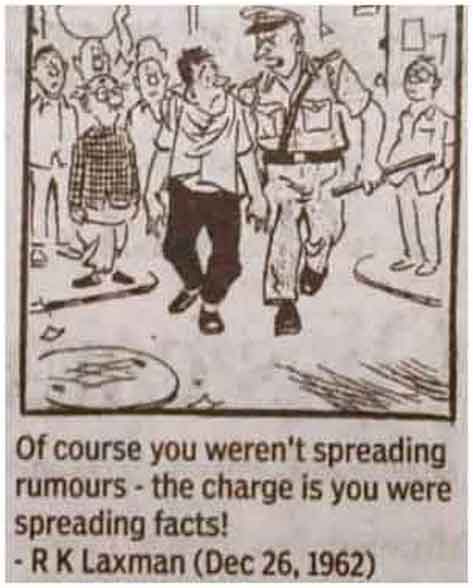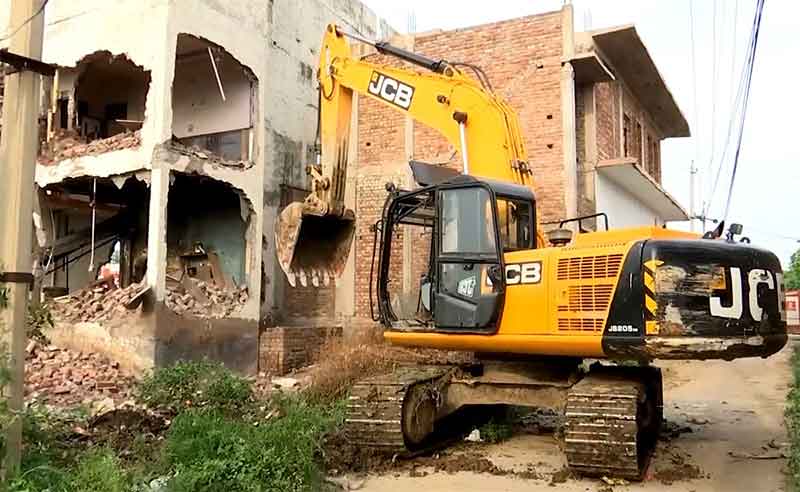
“There were 1,307 cases registered by the police, in the last 6 years, under Section 66A of Information Technology Act, 2000, after Supreme Court declared it as unconstitutional… … The police and prosecutors, who are perpetuating this abuse, should be jailed for contempt of court. There should be a severe disciplinary action against the magistrates for framing charges under this section, even if that implies dismissal from service…”
***
The Supreme Court of India is the champion of fundamental rights and guardian of people’s democratic rights. Its judicial statement is law for the nation.
Article 141 says the law declared by the Supreme Court shall be binding on all courts within the territory of India. Every judgement on important constitutional issue is the ‘law’ of the Supreme Court. ‘It is binding on all courts in India’ should mean that it is law for entire country. One cannot say that it is binding on courts but not on police or governments.
There are several criminal law sections that were struck down by the Supreme Court.
- In 1983, Section 303 of the Indian Penal Code (IPC) was struck down. This section provided capital punishment for murder by a person serving a life term in another case. It was held unconstitutional in Mithu v. State of Punjab. The Supreme Court explained that the punishment was not based on rational principle as no judicial discretion was available to a life convict.
- In Navtej Singh Johar v. Union of India 2018, the apex Court struck down Section 377 of the IPC criminalising “unnatural sex” as being unconstitutional.
- In Joseph Shine v. Union of India (2018), the Court held adultery as defined under Section 497 of the IPC as being manifestly arbitrary, discriminatory and violative of the dignity of a woman and therefore, unconstitutional.
- In Shreya Singhal v Union of India in 2015, Section 66A was declared unconstitutional by the Supreme Court.
Section 66A of Information Technology Act, 2000 (inserted by amendment) made messages deemed by the police to be offensive or menacing to anyone, or those that caused “annoyance” a criminal offence if these were sent through a computer or computer resource. It prescribed a prison term of up to three years on conviction. In a PIL filed by Shreya Singhal in 2015, the Supreme Court declared Section 66A of the IT Act as being violative of Article 19(1)(a) of the Constitution and not saved under the ambit of reasonable restrictions defined in Article 19(2). It had also said that the expressions used in Section 66A were open-ended, undefined and therefore arbitrary.
The definition of offence under this section was vague. It was so broadly defined that it took into its sweep protected speech also, and, therefore, upset the balance between the exercise of the free speech right and the imposition of reasonable restrictions on it. Still, the police used the penal section to deprive the writers on social media of their freedom.
The People’s Union for Civil Liberties (PUCL), filed a PIL that there were 1,307 cases were registered by the police after that judgment in the last 6 years. It also explained to the Court that as many as 745 cases are still pending in district courts in 11 States. The SC said that, “it’s a shocking state of affairs.”
The PUCL, quoting the figure of these cases across States, and asked the Court for issuance of guidelines against the registering of FIRs by the police under this dead section.
It was not for the first time that it was brought to notice of Supreme Court. In January 2019, too, the Supreme Court was requested to stop the misuse of this section. There are complaints, and police acted on them by registering cases under Section 66A, though was invalidated.
The Apex Court expressed surprise at that time also. Nothing happens by expression of surprise. Emboldened police officers continued to use or abuse the struck down penal definition.
The police headquarters and prosecutors in different States did not care about these surprises. They have not disseminated the invalidating effect of the Court ruling among officers manning police stations. Some of the police believe that such penal section is needed to control the atrocious postings on social media. They also quote certain incidents where police became helpless because of Supreme Court’s striking down of the section.
Some people may not really know this invalidation and perhaps out of that ignorance filed a complaint. We cannot say that police and prosecution offices also do not know. It is possible that they may not know. But their ignorance of law is no excuse. None can excuse them on this excuse.
There is also a possibility that some police officers might have deliberately used it to harass the people. Like slapping false cases and enjoy sadist pleasure as they suffer in jail till the courts discover it as false, the arrested persons under Section 66A also have to suffer until the trial courts decide the innocence.
If the magistrates themselves are ignorant of law or do not care when lawyers have brought to knowledge of the magistrates, what could be done?
The worst part is that the courts have framed charges under Section 66A even after the lawyers cited the Shreya Singhal Judgment of 2015 and that such section is no longer on statute. This has to be taken as serious indiscipline. It is a straight breach of Article 141 by magistrates.
When it is so specifically stated that invalidation of such section is declared by SC and that is law applicable for all the courts, how can courts defy it? The police and prosecutors, who are perpetuating this abuse, should be jailed for contempt of court.
There should be a severe disciplinary action against the magistrates for framing charges under this section, even if that implies dismissal from service. It will not be a punishment but preventing them from depriving some more persons of their rights.
Is it necessary for those concerned to wait for directions of the Supreme Court? Police chiefs and the directorates of prosecution have a constitutional duty to proactively begin a process of conveying to the lower courts and investigators all important judgments and their effect on the practices relating to investigation, prosecution and the framing of charges from time to time. If they have used it deliberately, what is the use of the Supreme Court repeatedly telling the same thing again and again.
It was reported that recently, police in Uttar Pradesh booked a journalist for defamation under Section 500 of the IPC, even though the Supreme Court had ruled that defamation can be pursued only by way of private complaints and there can be no FIR.
In the bare acts published by the government and private publishers, these sections that were struck down should be deleted and shifted to foot notes indicating that they were declared invalid. They should not be visible in main body of the bare Act or books on those Acts.
The magistrates should be alert enough to check invocation of such struck down sections by prosecutors or police at the cost of consequential criminal actions for failure. It is ridiculous and unconstitutional act of governments to defy the precedents. They deserve to be punished invoking powers for Contempt of Court. It is a real contempt.
***
Courtesy: Hans News Service | 27 July 2021
Dr. Madabhushi Sridhar Acharyulu was a Professor at Nalsar University of Law in Hyderabad, former Central Information Commissioner and presently Professor of Law, at Bennett University, Greater Noida.
Email:[email protected]













































